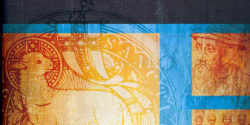
Book Notes: Calvin, Aquinas, and the Reformation
By Matthew Barrett–
Brannon Ellis. Calvin, Classical Trinitarianism, and the Aseity of the Son. Oxford: Oxford University Press, 2012.
Brannon Ellis takes on a massive and controversial subject in his new book, examining the different Reformation and post-Reformation reactions to Calvin’s understanding of the Son’s aseity or self-existence, particularly in light of the long history of “eternal generation.” Ellis also looks at Calvin himself, and how he affirmed the Son’s eternal begotteness, while simultaneously asserting his deity in and of himself. Ellis argues that Calvin did not stray from classical trinitarianism but his view sought to be the most consistent with it. Michael Horton commends the book, saying:
Ellis guides us on a well-researched and well-written tour of Calvin’s controversial defense of the Son’s aseity, its reception history, and the secondary literature among which this book itself now takes pride of place. Anyone interested in the history of Trinitarian reflection or the development of the Reformed theological tradition will be impressed by Ellis’s passionate interest in the subject as well as the seriousness, nuance, and weight of his arguments.
Euan Cameron. The European Reformation. Second Edition. Oxford: Oxford University Press, 2012.
Cameron’s second edition of The European Reformation is out. Cameron is Henry Luce III Professor of Reformation Church History at Union Theological Seminary, New York. Previously he taught at the University of Oxford. How is this second edition different, you ask? He has revised chapters 1, 15, and 21 in light of recent scholarship since his first edition, even adding new material to these chapters as well. Despite any changes, Cameron says one of the distinctive characteristics of the book that remains is that he, without apology, believes “that it is vital to take the theological content of the reformers’ thought seriously.” He claims to maintain the overall argument that was in the first edition.
Thomas Aquinas. The Power of God. Edited by Richard J. Regan. Oxford: Oxford University Press, 2012.
Well, this is not a new book. But it is an old book with a new editor, introduction, and publisher! The Power of God is Aquinas’s attempt, in ten questions, to understand how God’s power corresponds to the created order, whether it be the natural world or human beings. Aquinas also turns to the doctrine of the Trinity in order to comprehend how the three members relate to one another. Aquinas answers all types of questions, from “Is God’s Power Infinite?” to “Is There Procession in the Divine Persons?” However, note that Regan’s translation is an abridged version. So you will not get the full text here, but rather Regan’s synthesis of what he believes to be Aquinas’s most important passages. Anyone interested in understanding how Thomas understood God’s omnipotence as well as his doctrine of the Trinity will want to pick this volume up.
Scott M. Manetsch. Calvin’s Company of Pastors: Pastoral Care and the Emerging Reformed Church, 1536-1609 (Oxford Studies in Historical Theology). Oxford: Oxford University Press, 2013.
What a fascinating book this is! Manetsch takes us behind the scenes of Geneva, into Calvin’s ministry and relationship with different reformed pastors. He also takes us beyond Calvin, into the start of the seventeenth century as well, covering seventy years total. He observes the 130 men enrolled in Geneva’s Venerable Company of Pastors, including Pierre Viret, Theodore Beza, Simon Goulart, Lambert Daneau, and Jean Diodati. You will find more than theologians in these men; you will find committed pastors and shepherds of God’s flock, much after the likeness of Calvin. J. Todd Billings writes of this volume:
“In this rich and illuminating book, Scott Manetsch introduces readers to the fascinating cast of characters who served as Geneva’s ministers from 1536-1609. By carefully combining social history with historical theology, Manetsch probes the connection between pastoral theology and concrete practice among these ministers, presenting a marvelous portrait of Genevan pastoral life in Calvin’s day and afterward. Lucidly written, this book is a treasure for exploring pastoral identity in the Reformation context.” —J. Todd Billings
Matthew Barrett (PhD, The Southern Baptist Theological Seminary) is Assistant Professor of California Baptist University (OPS), as well as the founder and executive editor of Credo Magazine. He is the author of The Grace of Godliness: An Introduction to Doctrine and Piety in the Canons of Dort, Salvation by Grace: The Case for Effectual Calling and Regeneration, as well as the coeditor of Four Views on the Historical Adam (Counterpoints: Bible and Theology), and Whomever He Wills: A Surprising Display of Sovereign Mercy.




